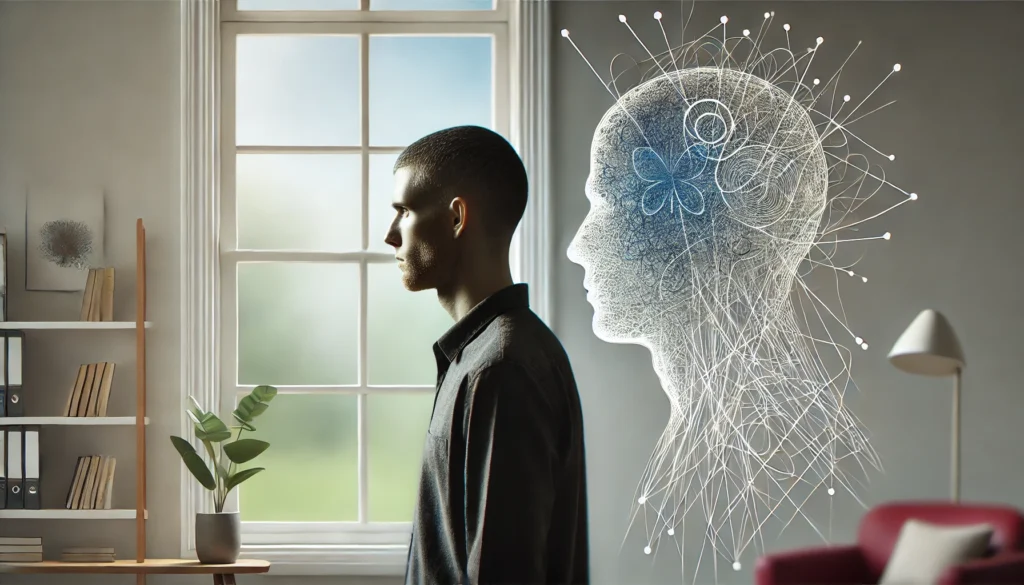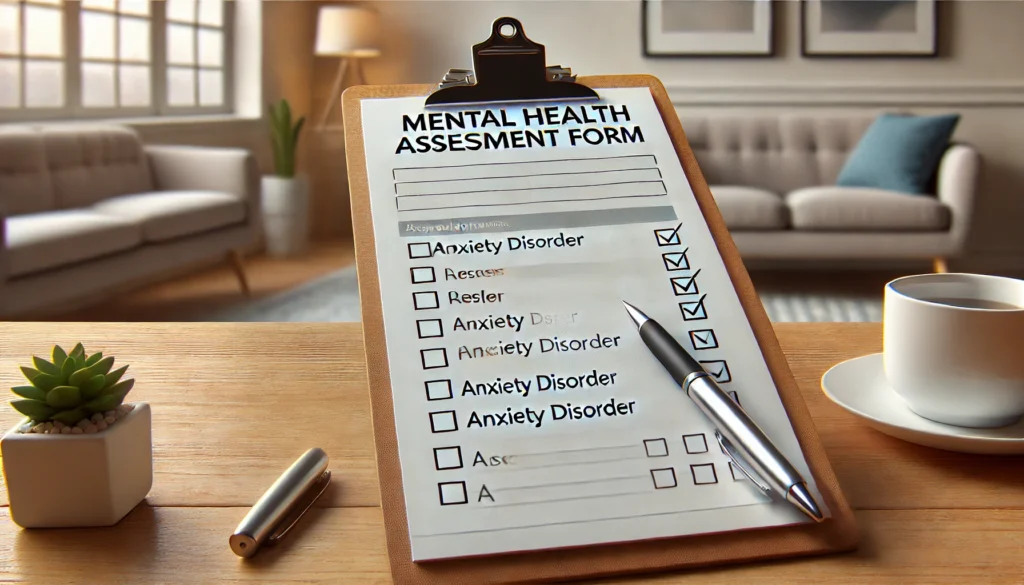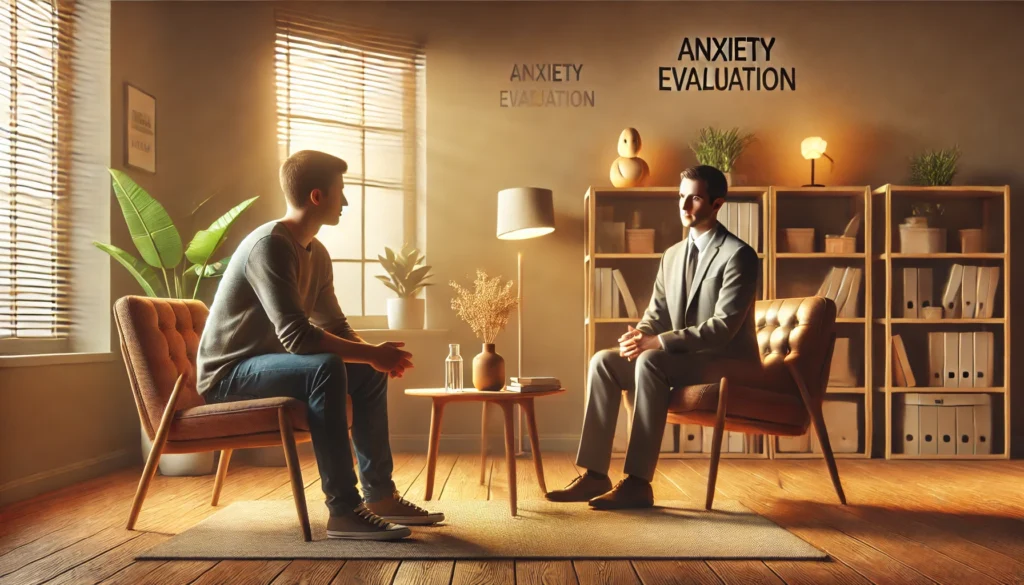Anxiety is a natural response to stress, but when it begins to interfere with daily functioning, relationships, or one’s sense of well-being, it may signal a more serious underlying issue such as an anxiety disorder. Despite its prevalence, anxiety remains misunderstood by many, and the process of diagnosing it can be daunting for those who are experiencing symptoms. For anyone asking questions like “how do you diagnose anxiety?” or “how to get tested for anxiety,” a deeper understanding of the diagnostic journey can make all the difference. This article provides a comprehensive, evidence-based exploration of how anxiety disorders are diagnosed, what tests and evaluations are involved, and which healthcare professionals are trained to assess and treat these conditions.
You may also like: Best Herbal Alternatives to Anxiolytics: Natural Remedies for Anxiety Relief
Recognizing the Symptoms: When Is Anxiety More Than Just Stress?
Many individuals experiencing intense worry or unease may wonder whether their symptoms are just a reaction to life’s demands or if they reflect something more chronic and clinical. Distinguishing between everyday stress and an anxiety disorder is a critical first step. Common symptoms of anxiety include persistent nervousness, restlessness, irritability, difficulty concentrating, muscle tension, sleep disturbances, and fatigue. These manifestations often vary from person to person, complicating the path to an accurate anxiety diagnosis.
To answer the question, “how is anxiety diagnosed?” it is essential first to acknowledge that not all experiences of anxiety meet the criteria for a formal disorder. Diagnosis requires that symptoms persist for at least six months and significantly impair daily life. This distinction ensures that normal emotional fluctuations aren’t pathologized, while individuals genuinely struggling with mental health for anxiety receive the help they need. Clinicians use standardized criteria to differentiate pathological anxiety from situational stress, and this precision is vital to providing effective care.
Understanding the Diagnostic Criteria: What Defines an Anxiety Disorder?
The most widely accepted reference for diagnosing mental health conditions in the United States is the Diagnostic and Statistical Manual of Mental Disorders, Fifth Edition (DSM-5), published by the American Psychiatric Association. According to the DSM-5, anxiety disorders are categorized based on shared features of excessive fear and behavioral disturbances. These include generalized anxiety disorder (GAD), panic disorder, social anxiety disorder, specific phobias, and others.
For anyone asking “how to get an anxiety diagnosis,” understanding these categories can help clarify the type of symptoms they may be experiencing. Generalized anxiety disorder, for instance, is characterized by chronic, exaggerated worry about various aspects of life, often accompanied by physical symptoms like muscle tension and fatigue. Panic disorder involves recurrent panic attacks and ongoing fear of future attacks. Social anxiety disorder focuses on overwhelming fear related to social interactions or performance situations.
Each subtype requires specific symptom presentations and durations for a valid anxiety disorder diagnosis. The DSM-5 criteria offer a structured approach for mental health professionals to determine whether a patient meets the threshold for diagnosis, ensuring that treatment is appropriately targeted and evidence-based.

The Initial Consultation: Who to See for Anxiety Evaluation
One of the most frequently searched questions online is “what doctor to see for anxiety.” The answer largely depends on the severity of symptoms and whether they coexist with other medical or psychiatric conditions. In many cases, the journey begins with a primary care physician who can perform an initial evaluation, rule out physical causes such as thyroid dysfunction, and refer patients to mental health specialists as needed.
For individuals wondering “who to see for anxiety,” licensed professionals such as psychologists, psychiatrists, and clinical social workers are equipped to provide comprehensive assessments. Psychiatrists are medical doctors who can diagnose mental health conditions and prescribe medications. Psychologists, who typically hold doctoral degrees in clinical psychology, specialize in therapy and diagnostic testing. Licensed clinical social workers and counselors can offer therapy and help navigate treatment planning.
Understanding who treats anxiety disorders ensures that individuals can access the correct form of support. Choosing the right provider is essential to establishing a trusting relationship, which facilitates accurate diagnosis and effective treatment. Holistic providers, particularly those familiar with integrative approaches, may also incorporate lifestyle, dietary, and herbal interventions into care plans.
Psychological Evaluations: Structured Tools for Diagnosing Anxiety
For those searching for how to get tested for anxiety, it’s important to recognize that the diagnosis process often includes both subjective and objective assessments. A psychological evaluation typically involves a combination of clinical interviews and standardized questionnaires that assess the nature, frequency, and intensity of symptoms.
Common diagnostic tools include the Generalized Anxiety Disorder 7-item (GAD-7) scale, the Beck Anxiety Inventory (BAI), and the Hamilton Anxiety Rating Scale (HAM-A). These instruments help clinicians evaluate the severity of anxiety and track symptom changes over time. They offer valuable insight for anyone wondering “how do you diagnose anxiety” in a clinical setting, and they are often used in combination with in-depth interviews to form a holistic understanding of the patient’s condition.
While no single test can definitively confirm an anxiety disorder, these tools provide a framework for evaluating anxiety disorders tests and diagnosis approaches that are scientifically validated. Mental health professionals use these evaluations not only to diagnose but also to monitor treatment progress, making them a key component of comprehensive care.

Differential Diagnosis: Ruling Out Other Medical and Psychiatric Conditions
A thorough anxiety diagnosis requires careful consideration of other possible explanations for a patient’s symptoms. For example, hyperthyroidism, cardiac arrhythmias, or side effects of certain medications can mimic the physical sensations of anxiety. Similarly, mood disorders like depression or bipolar disorder may include overlapping symptoms such as agitation or sleep disturbances.
This process, known as differential diagnosis, involves collecting a detailed medical history, conducting physical exams when necessary, and possibly ordering laboratory tests to exclude organic causes. The ability to discern when anxiety is primary versus secondary to another condition is central to effective treatment. This nuance underscores the importance of working with trained professionals who understand how is anxiety disorder diagnosed in a medical and psychological context.
Knowing how to get an anxiety diagnosis means understanding that diagnosis is not about labeling, but rather clarifying the underlying condition so that appropriate interventions can be initiated. Accurate diagnosis leads to personalized treatment, whether that includes cognitive behavioral therapy, medication, lifestyle changes, or integrative approaches involving holistic supplements.
Frequently Asked Questions: Anxiety Diagnosis and Testing
What is the most overlooked aspect when trying to understand how to get diagnosed with anxiety?
One of the most commonly overlooked factors in pursuing an anxiety diagnosis is the role that co-occurring conditions can play in obscuring symptoms. For example, individuals with chronic pain, hormonal imbalances, or sleep disorders might attribute their emotional distress to physical ailments, delaying appropriate mental health evaluation. When people ask, “how do you diagnose anxiety,” they often expect a straightforward answer, but the reality is that diagnosis is as much about ruling out what anxiety is not as it is about identifying what it is. Understanding this complexity underscores the need for a multidisciplinary approach that includes both mental and physical health screenings. Early recognition of overlapping symptoms can lead to faster and more accurate anxiety disorder diagnosis.
Can digital health tools support the anxiety diagnosis process?
Yes, digital tools such as mobile apps and online screening platforms are increasingly being used to support the process of identifying anxiety disorders. While they are not substitutes for professional assessments, these tools can serve as a preliminary step for those wondering how to get tested for anxiety or how to get an anxiety diagnosis. Many of these platforms use validated scales like the GAD-7 or offer symptom-tracking features that can provide valuable information to share with a healthcare provider. These tools can also make the process more accessible for people hesitant to visit a clinic or unsure about who to see for anxiety. The integration of digital health into anxiety disorders tests and diagnosis workflows is an evolving trend that offers both convenience and data-driven insights.
How does social stigma affect someone’s ability to get diagnosed with an anxiety disorder?
Social stigma can have a significant impact on whether or not someone seeks help, especially when they question how to get diagnosed with anxiety without feeling judged. Individuals often fear being seen as weak or unstable, which can prevent them from openly discussing symptoms with family, friends, or healthcare providers. This stigma can also influence which professionals they feel comfortable approaching when considering who treats anxiety disorders. Overcoming internalized stigma requires not only public awareness campaigns but also compassionate and judgment-free care environments. Reducing this barrier is essential for encouraging people to ask, “how do I get diagnosed with anxiety disorder?” without fear of discrimination.
What are some lesser-known specialists who treat anxiety disorders?
While psychiatrists and psychologists are the most well-known professionals for handling anxiety disorder diagnosis, other specialists also contribute meaningfully to care. For instance, psychiatric nurse practitioners can evaluate and prescribe treatment plans, especially in areas with a shortage of mental health professionals. Integrative medicine doctors and functional medicine practitioners may provide holistic evaluations that include anxiety-related symptoms. Additionally, clinical pharmacists trained in psychiatric medication management can help optimize treatment after an initial anxiety diagnosis. Knowing who to see for anxiety goes beyond traditional roles and includes a growing network of interdisciplinary providers.
Are there risks in self-diagnosing anxiety based on internet research?
Absolutely. Self-diagnosing based on online symptom checkers or anecdotal information can lead to unnecessary stress, mislabeling of other conditions, or delays in seeking professional help. While many people turn to the internet asking, “how is anxiety diagnosed,” the answer cannot be fully captured without a clinical context. Self-diagnosis can result in the misuse of over-the-counter supplements or even prescription medications obtained without proper oversight. Additionally, individuals may downplay serious symptoms by assuming they are merely anxious, overlooking more severe mental health conditions. This is why structured anxiety disorders tests and diagnosis methods conducted by qualified professionals remain the gold standard.
How can someone prepare for their first appointment when seeking an anxiety diagnosis?
Preparation can significantly improve the outcome of an initial mental health evaluation. Individuals who want to know how to get diagnosed with anxiety should consider keeping a symptom journal for at least two weeks before their visit. This can include emotional triggers, physical sensations, sleep patterns, and coping strategies used. Bringing this documentation to an appointment can help clinicians understand the full picture, speeding up the anxiety disorder diagnosis process. It also fosters a more collaborative relationship with the provider, whether they are a psychiatrist, psychologist, or another professional who treats anxiety disorders.
Is it possible to get an accurate anxiety diagnosis in a single session?
While it is technically possible for a skilled clinician to provide an initial diagnosis in a single session, comprehensive anxiety disorder diagnosis often unfolds over multiple appointments. A one-time evaluation may not capture the full complexity of an individual’s mental health for anxiety, particularly if they have fluctuating symptoms or a complex medical history. Additional sessions allow providers to administer formal anxiety disorders tests and diagnosis tools, observe changes over time, and refine treatment plans. For individuals asking, “how is anxiety disorder diagnosed thoroughly?” the answer often lies in a multi-step process rather than a single consultation.
What role do cultural factors play in anxiety diagnosis?
Cultural perceptions of mental health can significantly influence both the expression of symptoms and the likelihood of seeking help. In some cultures, emotional distress is more likely to be reported as physical discomfort, which can obscure an accurate anxiety diagnosis. Furthermore, people from marginalized backgrounds may experience systemic barriers that limit access to appropriate care. Understanding how to get diagnosed with anxiety in a culturally competent context means finding providers who respect and incorporate cultural identity into the diagnostic process. This sensitivity is particularly important when considering who treats anxiety disorders in diverse populations.
Can a general practitioner provide an accurate anxiety diagnosis?
Yes, many general practitioners (GPs) are trained to recognize and provide an initial diagnosis of anxiety, especially in mild to moderate cases. They often serve as the first point of contact for patients wondering what doctor to see for anxiety. While GPs may not conduct in-depth psychological testing, they can offer screening questionnaires, rule out physical causes, and refer patients to specialists for further evaluation. For individuals exploring how to get an anxiety diagnosis, starting with a GP can be a practical and accessible first step. However, follow-up with a mental health specialist is typically necessary for a more nuanced assessment and long-term care.
What should someone do if they receive conflicting anxiety diagnoses from different providers?
It is not uncommon for individuals to receive slightly different assessments when consulting multiple providers, especially if symptoms overlap with other conditions like depression or ADHD. In such cases, it helps to consolidate information from various evaluations, including anxiety disorders tests and diagnosis records, into a shared health journal. Seeking a third opinion from a provider experienced in complex cases can also be beneficial. When in doubt about how is anxiety diagnosed consistently across providers, remember that mental health for anxiety involves nuanced interpretation, not just checklists. Ultimately, a diagnosis should align with the individual’s lived experience and be accompanied by a personalized care plan that resonates with their goals and values.

The Role of Holistic Practitioners in Anxiety Diagnosis and Support
In recent years, there has been increasing interest in how holistic and integrative health professionals contribute to the diagnosis and management of anxiety disorders. While they may not offer formal medical diagnoses, holistic practitioners such as naturopathic doctors, functional medicine specialists, and herbalists can play an instrumental role in identifying imbalances that contribute to anxiety symptoms.
These providers often assess the patient through an extensive intake process that includes nutrition, sleep patterns, hormonal health, and lifestyle factors. When clients ask questions such as “how do I get diagnosed with anxiety disorder,” holistic practitioners may help bridge the gap between conventional medicine and complementary care. They are particularly attuned to issues like micronutrient deficiencies, chronic inflammation, or gut-brain axis dysfunction that may underlie or exacerbate anxiety.
Although they typically work alongside, rather than replace, licensed mental health providers, these holistic professionals can provide valuable context and support. Their involvement can enhance outcomes, particularly when anxiety is multifactorial in origin. Integrating their insights into a broader treatment plan contributes to a more comprehensive and individualized approach to mental wellness.
clinical anxiety symptoms, generalized anxiety overview, mental health screening tools, therapy options for anxiety, psychiatric evaluations, stress-related disorders, holistic anxiety management, integrative mental health, emotional health support, cognitive behavioral therapy for anxiety, natural treatments for anxiety, identifying anxiety triggers, behavioral health assessments, wellness approaches to anxiety, personalized mental health care, understanding emotional distress, psychological symptom evaluation, mental health practitioner roles, managing chronic anxiety, early intervention for anxiety
Further Reading:
Disclaimer
The information contained in this article is provided for general informational purposes only and is not intended to serve as medical, legal, or professional advice. While NewsHealthWatch strives to present accurate, up-to-date, and reliable content, no warranty or guarantee, expressed or implied, is made regarding the completeness, accuracy, or adequacy of the information provided. Readers are strongly advised to seek the guidance of a qualified healthcare provider or other relevant professionals before acting on any information contained in this article. NewsHealthWatch, its authors, editors, and contributors expressly disclaim any liability for any damages, losses, or consequences arising directly or indirectly from the use, interpretation, or reliance on any information presented herein. The views and opinions expressed in this article are those of the author(s) and do not necessarily reflect the official policies or positions of NewsHealthWatch.

